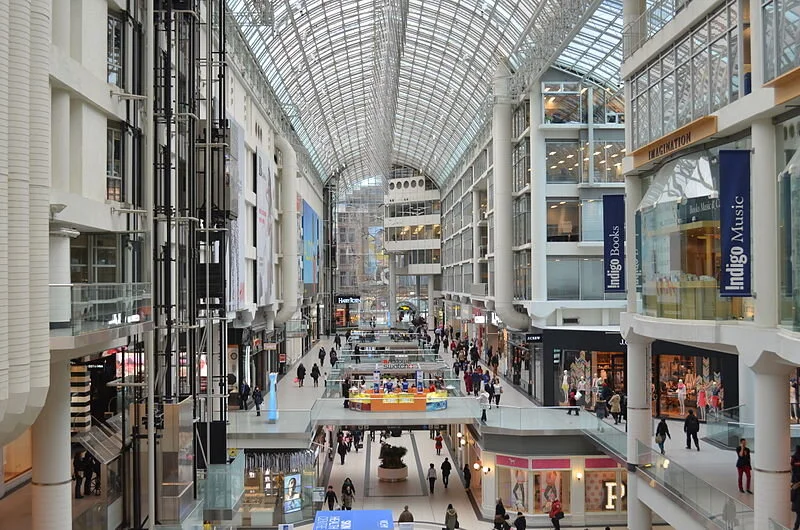Is 2020 The Year When Retail Will Have To Change Radically?
/CF Toronto Eaton Centre Photo: Wikipedia
Innovative changes in technology have marked the last years, and with these changes, both good and bad things come. Retail is not exempted from being taken by storm by the new technology that becomes part of everyday life more and more.
Regardless of what they sell, be it clothes or refrigerated microcentrifuges, retail businesses will have to take into consideration all the new challenges 2020 brings along if they want to remain relevant.
1. The human experience will become invaluable
If there is one thing retail stores can offer and other ways of selling products to customers cannot, it is a human experience. The online shopping spots haven’t gotten to that level of personalization yet that they can replace a good sales assistant. Therefore, retail shop owners need to bear one thing in mind: to hire personnel that can offer shoppers what an online experience cannot.
2. Customers become more and more responsible
Shopping will not necessarily slow down, but it will change tremendously. As customers become more and more conscious of the impact of their actions on the environment, they will modify their shopping behavior. In other words, they may pay more for premium products that comply with their set of environmentally conscious values, rather than spend a lot of money on numerous products that will end up at the landfill.
3. Brick and mortar stores will become more important
This idea may sound counterintuitive since the last few years have seen such a massive shift from offline to online shopping. However, it appears that shopping online exclusively will suffer a shift back, as well. The change is interesting since it seems that customers prefer to research a product online but then go to a store to buy it. In other words, online businesses may start to help offline businesses for the first time since the beginning of retail fragmentation.
4. A focus on local markets is on the rise
The importance of localization has never been more the focus of smart retail businesses than now. People may like to shop online, but their tastes are diverse. They want things they can only find locally. Even if you run an online business, being capable of delivering what locals want can put you in a much better place than a national or international retailer that doesn’t have the possibility to explore local preferences.
5. Social media puts the foot in the door
Convenience is essential, and that’s why retail businesses should focus on this aspect, too. People spend a lot of time online, and where do they actually spend most of this time? The correct answer is social media. Here they socialize with their friends, they meet new people, they exchange opinions, they read the latest news and so on, so why shouldn’t they shop here, too?
2020 is the year when a vital move will be noticed in how social media operates. In-app purchases will become the norm, and customers will find it much easier to conduct all their shopping while using social media, something that any retail business should bear in mind.
6. There will still be bankruptcies
Old business models have already lost the battle, but there are still a few left standing, and they will either adapt to the new conditions, or they will have to surrender completely. Massive retail chains have had the upper hand for so long because of their size. However, what used to be their main advantage has now turned into the proverbial stone around their necks.
That is why 2020 will still be the year when notorious bankruptcies will still occur. Such giants don’t have the same agility as small stores, and that will continue to be their downfall.
7. Amazon might notice the first signs of decline
Ever since its inception, Amazon has been a rising star, but due to some delicate and rather controversial issues regarding pricing politics and the rise, it might turn into a supernova. We’re not there just yet, but its world dominance strategies might begin to show cracks, as well.
Also, famous names, such as Nike, have already decided to leave the platform, preferring to face the online competition head-on, rather than staying with Amazon. Small retailers will still prefer Amazon since they don’t have the same reputation as the earlier mentioned manufacturer of sports goods, but this can be a sign.
8. Middle-class customers are fewer and fewer
Retail businesses have always depended on a solid middle class with money to spare. However, with the wealth gap growing more and more, we also witness a decline of the middle class as we know it. One of the clear signs of this happening is the way secondhand apparel is the only sector thriving when it comes to clothing stores. In other words, people prefer to buy second hand clothes rather than spend money on new ones.


![Retail-insider-NRIG-banner-300-x-300-V01-3[2].jpg](https://images.squarespace-cdn.com/content/v1/529fc0c0e4b088b079c3fb6d/1593476525034-QRWBY8JUPUYFUKJD2X9Z/Retail-insider-NRIG-banner-300-x-300-V01-3%5B2%5D.jpg)
![Retail-insider-NRIG-banner-300-x-300-V01-2[2].jpg](https://images.squarespace-cdn.com/content/v1/529fc0c0e4b088b079c3fb6d/1593476491497-W6OZKVGCJATXESC9EZ0O/Retail-insider-NRIG-banner-300-x-300-V01-2%5B2%5D.jpg)
![Retail-insider-NRIG-banner-300-x-300-V01-4[2].jpg](https://images.squarespace-cdn.com/content/v1/529fc0c0e4b088b079c3fb6d/1593476508900-TJG5SNQ294YNOCK6X8OW/Retail-insider-NRIG-banner-300-x-300-V01-4%5B2%5D.jpg)